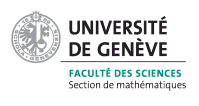Program and talk slides
The Swiss Numerical Analysis Day 2015 takes place at Uni Bastions in lecture hall B106 (first floor) on Friday April 17, 2015.
Université de Genève, Uni Bastions. Rue De-Candolle 5, 1205 Genève, Switzerland.
NEW: The full program with the list of abstracts is now available for download: colloqnum15_program.pdf (version: April 15, 2015).
| 09:30 - 09:50 | Registration |
| 09:50 - 10:00 | Opening |
| 10:00 - 10:50 | Prof. Christian Lubich (University of Tübingen) Dynamical low-rank approximation |
| 10:50 - 11:20 | Coffee break |
| 11:20 - 12:40 | Contributed plenary talks |
| 12:40 - 14:10 | Poster session and lunch |
| 14:10 - 15:30 | Contributed plenary talks |
| 15:30 - 16:00 | Coffee break |
| 16:00 - 16:50 | Prof. Andrew Stuart (University of Warwick) Probabilistic Numerical Methods for Deterministic Differential Equations |
| 16:50 - 17:00 | Closing |
Invited plenary talks (with slides of presentations)
- Christian Lubich (University of Tübingen), Dynamical low-rank approximation.
- Andrew Stuart (Warwick University, Mathematics), Probabilistic Numerical Methods for Deterministic Differential Equations.
Contributed plenary talks (with slides of presentations)
- Mario Amrein (Univ. Bern), Adaptive Newton methods for semi-linear problems with singular perturbations.
- Luca Dede’ (EPF Lausanne), Efficient BDF time discretization of the Navier-Stokes equations with VMS-LES modeling in a High Performance Computing framework.
- Vladimir Kazeev (ETH Zurich), The approximation of singular functions with quantized-tensor finite elements in two dimensions.
- Marie Kray (Univ. Basel),Wave splitting for time-dependent scattered field separation.
- Sebastian Krumscheid (EPF Lausanne), Obtaining coarse-grained models from multiscale data.
- Daniel Ruprecht (Lugano), Parallel-in-time integration with PFASST.
- Lorenzo Tamellini (Univ. Lausanne), An adaptive sparse grid algorithm for elliptic PDEs with lognormal diffusion coefficient.
- Monika Weymuth (Univ. Zurich), An adaptive local basis for elliptic problems with complicated discontinuous coefficients.
Invited plenary talk abstracts.
- Christian Lubich (University of Tübingen)
Dynamical low-rank approximation.
This talk reviews differential equations on manifolds of matrices or tensors of low rank. They serve to approximate, in a low-rank format, large time-dependent matrices and tensors that are either given explicitly via their increments or are unknown solutions of high-dimensional differential equations, such as multi-particle time-dependent Schrödinger equations. Suitable numerical integrators are based on splitting the projector onto the tangent space of the low-rank manifold at the current approximation. In contrast to all standard integrators, these projector-splitting methods are robust with respect to the presence of small singular values in the low-rank approximation.
The talk is based on work done intermittently over the last decade with Othmar Koch, Achim Nonnenmacher, Ivan Oseledets, Bart Vandereycken, Emil Kieri and Hanna Walach.
- Andrew Stuart (Warwick University, Mathematics)
Probabilistic Numerical Methods for Deterministic Differential Equations.
Numerical solutions of differential equations contain inherent uncertainties due to the finite dimensional approximation of a function. In modelling scenarios where the quantification of uncertainty is a key goal it is therefore important to study the uncertainty introduced by the numerical method, in order to determine its importance relative to other uncertainties, such as those caused by noisy data or by model error. This work is concerned with a probabilistic methodology for doing so. We demonstrate an approach which gives rise to root mean square convergence rates which are consistent with the underlying deterministic method. Furthermore, we employ the method of modified equations to demonstrate enhanced rates of convergence to stochastic or random perturbations of the original deterministic problem. Ordinary differential equations and elliptic partial differential equations are used to illustrate the approach.
This is joint work with Patrick Conrad, Mark Girolami (both Warwick, Statistics), Simo Sarkka (Aalto BECS) and Konstantinos Zygalakis (Southampton, Mathematics).


